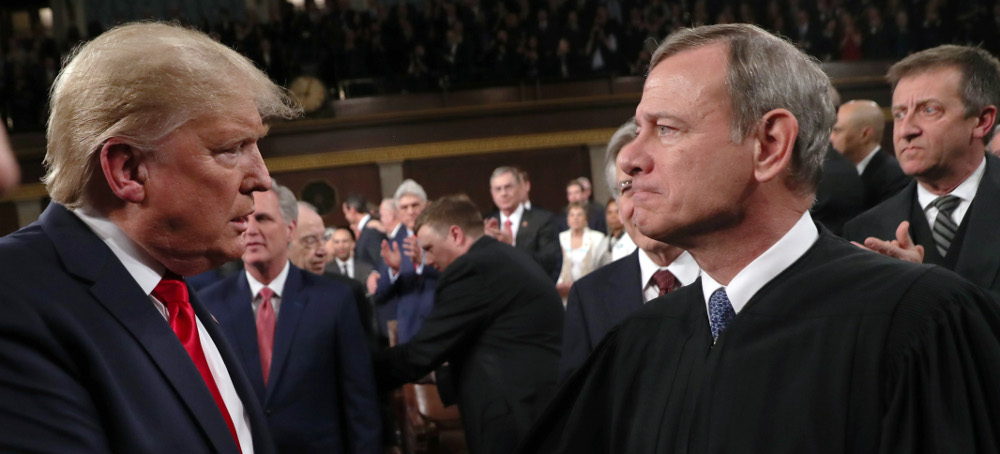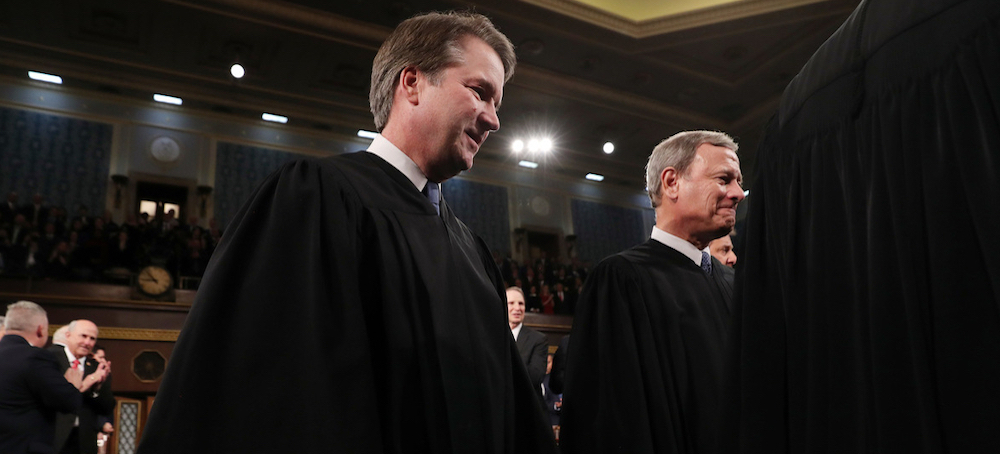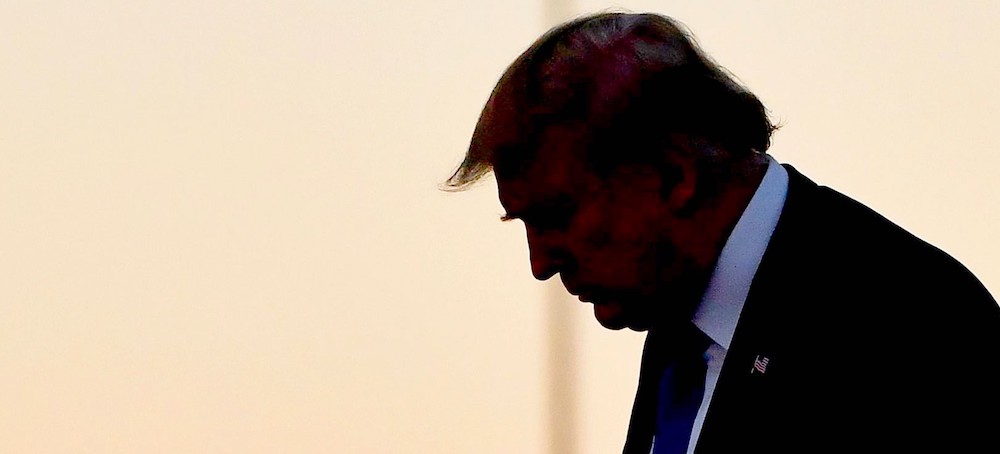
In 2017, a Moscow souvenir kiosk offered a drawing depicting Russian President Vladimir Putin holding a baby with the face of Donald Trump, based upon a propaganda poster showing late Soviet leader Joseph Stalin holding a baby.
By Charles Jay for Community Contributors Team
Community
REPUBLISHED BY:
Former President Donald Trump’s Big Lie about the 2020 presidential election is now being propagated in a new world history textbook for Russian high school students. As for President Joe Biden, he’s described in the new textbook as corrupt and tied to business interests in Ukraine.
On Monday, Marc Bennetts, a foreign correspondent for The Times of London, posted images on X, formerly known as Twitter, with a translation from the new textbook written for Russian students in the 11th (graduating) grade.
The textbook says Trump lost the 2020 election “as a result of obvious electoral fraud by the Democratic Party.” As for Biden, the textbook claims, "His entire political career has been accompanied by corruption scandals. He and his family have commercial interests in Ukraine."
Of course, there’s no mention that Trump is facing criminal charges accusing him of attempting to overturn the results of the 2020 election or that his claims of massive election fraud have been widely debunked in the courts as well as by former Attorney General William Barr and others who served in his administration. And despite concerted efforts by House Republicans to discredit Biden, they have yet to produce any evidence of wrongdoing.
And just look at the images used: Trump with a beaming smile on his face; Biden with his face covered by a black mask.
Newsweek reported that Konstantin Sonin, a Russian-born economist who is now a professor at the University of Chicago, provided more details about the textbook.
Newsweek wrote:
When contacted for more information about the textbook, Sonin provided Newsweek with a PDF copy of the book. He also told Newsweek that he didn't doubt the authenticity of its contents and that the book's publication was announced earlier this year during a press conference by the book's authors and Sergei Kravstov, Russia's minister of education.
In a post on X, Sonin displayed the cover of the textbook alongside the Trump entry. The textbook covers the period from 1945—the end of World War II—to the beginning of the 21st century.
Sonin cited the Trump entry as an example of the “reverse cargo cult’’ that “is a staple of authoritarian propaganda.”
“Under the ’cargo cult,’ the locals believe that imitating elections will bring as much prosperity as real elections in democratic countries,” Sonin continued. “Under the ‘reverse cargo cult,’ the locals believe that the fact that their own elections are fake means that elections in democracies are fake as well.”
In the quotation, Putin agreed with Trump’s own attempts to portray the prosecutions as politically motivated.
“It shows the rottenness of the American political system, which cannot pretend to teach others about democracy,” Trump quoted Putin saying in the speech. Trump added: “They’re all laughing at us.”
But wait—there’s more. In another post on X, Bennetts added this about the new textbook:
Barely a word about the collapse of the Soviet Union in the new Russian school history textbook for 11th graders. Not one mention of the words perestroika or glasnost. Says Cold War ended because of "unilateral concessions" by Gorbachev to the West.
“Perestroika” (“restructuring”) was the term used to describe Soviet leader Mikhail Gorbachev’s policy in the mid-1980s to reform economic and political policy, and “glasnost” (“openness”) allowed for more criticism of government officials and eased censorship on the media—policies that are antithetical to what Putin is doing in Russia today.
The textbook reflects a broader effort to indoctrinate young Russians to support Putin and the war in Ukraine.
In June, The New York Times wrote that since the war in Ukraine began, “educational programs across Russia are awash in lessons and extracurricular activities built around military themes and patriotism.”
The drumbeat of indoctrination essentially started with Russia’s 2014 annexation of Crimea, but the full-scale invasion of Ukraine has accelerated it. The Ministry of Education and Science releases a constant stream of material, including step-by-step lesson plans and real-life examples — like a video of a student concert that used poetry, dance and theater to explain the history of Russian foreign intelligence.
“It includes all levels, from kindergarten to university,” said Daniil Ken, the head of the Alliance of Teachers, an independent Russian union, who works from voluntary exile. “They are trying to involve all these children, all students, directly in supporting the war.”
And at the start of the new school year in September, Nina Rozhanovskaya of the Kennan Institute, a leading center for advanced research on Russia and Eurasia, wrote on the institute’s blog “The Russia File” that “classrooms are turning into an ideological battleground.”
She wrote:
Starting in September 2022, schools across Russia begin every week with a flag-raising ceremony followed by a lesson entitled “Conversations about Important Things.” Vladimir Putin personally kick-started the first Important Conversations series last year by giving an “open lesson” to a select group of students and telling them that Russia’s mission in Ukraine was to “stop the war” and “protect the people” in the Donbas. During this year’s televised “open lesson” Putin told his young audience that Russians were “invincible.”
Researcher Ivan Fomin has identified a strong anti-Western slant in how the teaching guidelines for Important Conversations cover certain topics, along with the message that “the state is the most authoritative source of information” about everything. Teachers are meant to put forward the idea of national unity and patriotism, emphasize heroism and self-sacrifice, and promote “traditional values.” In 2022, one of the conversations focused on the annexation of Crimea, or, as the official narrative refers to it, “the reunification of Crimea with Russia.”
And here’s how she described the new world-history textbook:
Public debate was sparked ahead of the academic year by a new Russian history textbook for the 11th grade, the final year of high school. Co-authored by presidential aide Vladimir Medinsky and MGIMO rector Anatoly Torkunov, it reframes Soviet and Russian history from 1970s onwards in accordance with today’s political agenda, and there is a separate chapter on the so-called “special military operation,” which demonizes the West and presents Russia’s aggression against Ukraine as justified. Commentators criticize the new textbook for the chaotic presentation and tendentious interpretation of recent history and current events. Historian Nikita Sokolov called it an “outrageously bloated propaganda leaflet.” Unmoved by the public outcry, Education Minister Sergei Kravtsov promised that fifth to ninth graders will get their own new history textbooks next year.
And the same attempt at indoctrinating youth is happening right here in Republican-controlled states, where authoritarian-minded governors like Greg Abbott of Texas and Ron DeSantis of Florida are attempting to alter or drop lessons about black and LGBTQ+ history.
The Texas Tribune reported that last month the Republican-controlled Texas State Board of Education “rejected seven of 12 proposed science textbooks for eighth graders that for the first time will require them to include information on climate change.”
Florida already gained notoriety when its new African American history standards included teaching that some enslaved Black people benefited from slavery because it taught them useful job skills.
And then, in August, Florida became the first state to approve PragerU’s ersatz K-12 curriculum, The New Republic reported.
The New Republic described PragerU, co-founded by conservative radio host Dennis Prager, as “a right-wing group that has explicitly stated it wants to indoctrinate children.”
It wrote:
PragerU is not an accredited academic institution. Rather, it’s a conservative advocacy group cloaked in the guise of scholars that are best known for spreading disinformation on climate change, questioning the role of slavery as the pretext for the Civil War, and generally dismissing any acknowledgment of racism (especially against Black Americans) throughout American history.
This photo is about as real as Russia's new high school history book, but it does make a point.




























